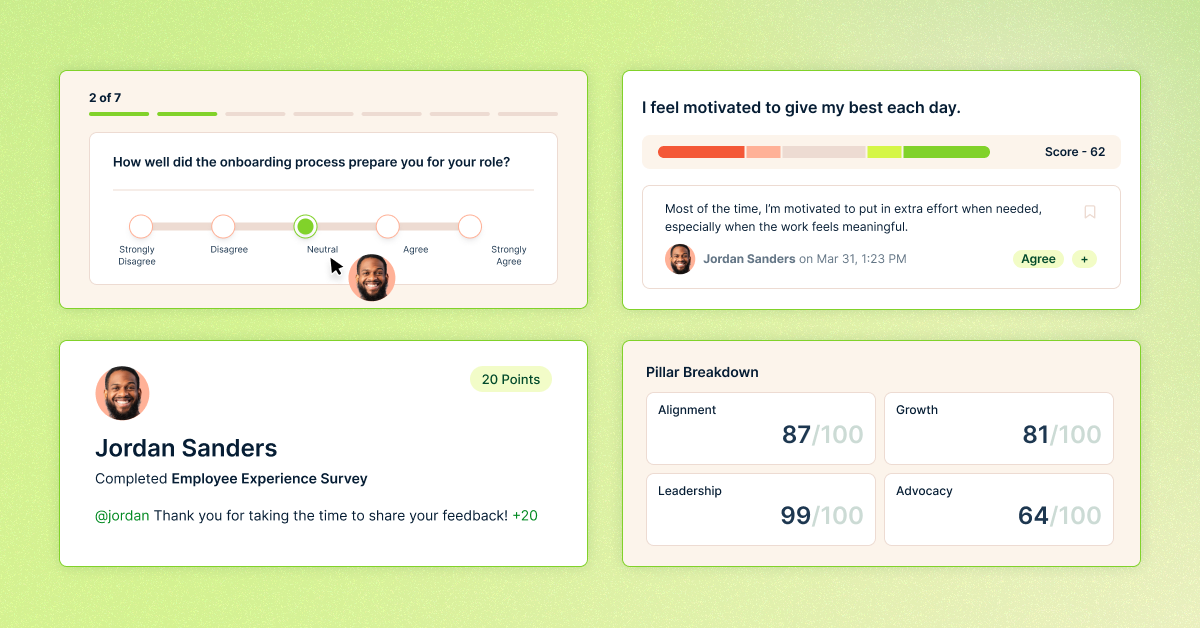Financial Services Employee Recognition Program: 10 Ways To Reward Excellence

From credit unions to board rooms, financial services employees have varying experiences. Yes, some financial services employees are well-compensated, with juicy bonuses and six-figure salaries, but many positions or organizations don't enjoy the same riches.
No matter the rank, role, or compensation involved, all financial services employees deserve recognition for their hard work and dedication. This guide explores ten innovative ways to reward financial services workers and best practices to ensure employees feel valued and engaged.
Why Should Financial Services Employers Recognize Their People?
Whether praising the efforts of an investment banker or a small firm accountant, employers gain several advantages when they offer recognition to the people who form the backbone of their businesses:
Recognition Improves Employee Productivity
Employees who receive regular praise and recognition for their efforts are likely to work harder and be more productive for your organization. Nectar's employee recognition survey reveals that 77.9% of workers would be more productive if they were acknowledged more frequently. We're not talking about the occasional "thank you" during an annual performance review. If you want your appreciation to resonate with your employees, offering consistent recognition (weekly or monthly) is your best bet.
Recognition Creates A Welcoming And Inclusive Work Environment
Appreciating your employees for their ideas, efforts, and contributions creates a psychologically safe space for them to thrive in. When individuals feel valued and respected, they’re more likely to contribute their best ideas and push boundaries that benefit the organization.
Unfortunately, this doesn’t always happen. A leaked Goldman Sachs employee survey found that 92% of first-year analysts have frequently been shunned or ignored in meetings. And 50% experienced unwarranted, invalid, or public criticism often.
Recognition Can Support Burnout
Employee burnout is prevalent in the financial services industry. Global digital accountancy platform LemonEdge found that:
- 31% of financial services and banking professionals plan to leave the industry due to the high pressure associated with their roles
- 23% are concerned about their physical or mental health
- 42% report that a heavy workload is the main reason for feeling heightened pressure in their role, 36% blame manual processes, 32% long working hours, 26% tight deadlines, and 25% increasing demands from management
- 25% believe that more recognition and support from management would improve their experience.
Employee recognition can improve morale by showing employees that their hard work is valued and appreciated. Nectar's research supports this, reporting that 92% of finance and insurance professionals agree meaningful recognition impacts their job satisfaction.
Recognition Attracts And Retains Talented Workers
Bank employee recognition programs are a perk that current and prospective employees look for when evaluating a financial services employer. As companies struggle to hold onto skilled workers and institutional knowledge, a simple act like offering appreciation and rewards can go a long way in keeping your best workers from leaving. Nectar’s research found that 74% of finance and insurance professionals would be less likely to leave their organization if they were recognized more frequently.
Deloitte reports a particular battle faced by financial services organizations is a shrinking pipeline of future female leaders. 45% of women in senior leadership roles plan to leave their current employer over the next year. Persuade them to stay by creating a culture of recognition where women receive equal recognition for their work.
Recognition Counters The Impact Of Return-To-Office Mandates
One reason women are moving away from the financial services industry is the increase in return-to-office mandates. Companies are cracking down on remote and hybrid work, no longer considering this model favorable to their business. Yet, Deloitte's research found that for finance leaders who currently work remotely at least part of the time, two-thirds would consider leaving their current job if required to return to the office five days a week. The data also finds that leaders with caregiver responsibilities are 1.3x more likely than non-caregivers to leave their organization if they cannot work remotely.
A consistent recognition program supports this situation in two ways.
First, regular expressions of gratitude persuade peers, managers, and leaders to notice the small and large behaviors that positively benefit the company. If you've been overlooking the fantastic work that your remote and hybrid employees have been doing at home, activating recognition can cause you to rethink the need for RTO mandates.
Secondly, if you really do require your finance staff back in the office, give them a reason to be there. Show gratitude for their presence and productivity in your organization to counter any negativity surrounding your policy.
Recognition Ensures Consistent Skills Development
According to MetLife's "The Advantages of Employee Care" report, 35% of workers say that learning and development are among the top three elements of the employee experience. Regular upskilling also benefits businesses positively, ensuring your teams and individual workers remain up-to-date with the latest financial industry trends, products, and legislation.
L&D slots seamlessly into a recognition program. Leaders can design employee challenges to incentivize training course participation or offer voluntary development opportunities. Additionally, they can reward coworkers who excel in their professional development.

10 Top Financial Services Employee Recognition Programs
Employee recognition programs can significantly reshape the workplace environment in high-pressure industries such as finance. Here are ten innovative ideas to effectively recognize and reward your employees while fostering a culture of appreciation and continuous growth.
1. Implement A Peer Recognition Program
Giving praise and appreciation to those who work alongside you daily is a simple way to improve team camaraderie and deepen social connections at work. However, Nectar's research reveals that finance peers don't exchange enough gratitude. 60% of finance and insurance professionals wish their colleagues told them "thank you" more often.
Jim Pendergast is Senior Vice President for altLINE by The Southern Bank Company. He shared his experience building a peer recognition program that allows team members to acknowledge each other's hard work and dedication.
“Each month, employees nominate a peer whom they believe has gone the extra mile, explaining how their actions contributed to the team's goals. The nominee then receives a small reward, such as a gift card or an extra day off.
Our program boosts morale and promotes a positive work culture where appreciation is part of our everyday interactions. It encourages the team to look out for and celebrate each other's successes, fostering a more cohesive and motivated team environment. The peer-to-peer recognition also adds a layer of sincerity to the appreciation, as it comes directly from colleagues who witness each other's efforts firsthand.”
If you want to create a more consistent peer recognition program, using a tool like Nectar will make it easy to deliver frequent and meaningful recognition to your employees. Nectar has a website, mobile application, and integrations into popular chat tools like Slack and Microsoft Teams. It will be easy for all of your employees to share positive feedback throughout the month.
2. Introduce A Spotlight Program
Where peer recognition honors all the employees who make a difference to their colleagues, a spotlight program zooms in on one specific worker who has achieved excellence over a specific period. Michael Dion, Chief Finance Nerd for F9 Finance, describes the process, including how the winner is celebrated.
“Nominations can be gathered from across the company, including peers, managers, and subordinates, based on customer feedback, teamwork, and innovation. The selected individual will be featured in the company newsletter, receive a trophy during a company-wide meeting, and be granted an extra day off.”
John Crist, Managing Director of Prestizia Insurance, believes that the impact of the spotlight isn't restricted to the winner but ripples across the organization. He told us:
“Sharing these success stories during team meetings further motivates others by showcasing tangible pathways to acknowledgment and success within our organization.”
3. Create Employee Awards
Similar to a Spotlight program, some financial institutions create employee awards based on specific behaviors or achievements. For example, Wells Fargo Bank’s recognition program includes the following annual awards:
- Enterprise Diversity & Inclusion Champion Award: This company-wide initiative celebrates employees or groups who have excelled at promoting diversity and inclusion practices.
- Enterprise Risk Champion Award: Also a company-wide program, this award honors people who exceed the risk management expectations of their role.
These are just two examples of awards you could distribute in your organization. Some other employee award ideas for your finance workers include:
- Innovation Award: Celebrating those who have made significant positive changes to processes, products, or services.
- Community Impact Award: Recognizing employees who demonstrate commitment and contribution to the community through volunteer work or fundraising.
- Collaboration Award: Acknowledging individuals or teams who excel at working with colleagues across departments.
- Sales Achievement Award: Celebrating top performers in sales, whether for a specific product or overall performance.
4. Deliver On-The-Spot Recognition
Timely recognition for great work strongly impacts employees in any industry. Nectar's research found that 49% of employees receive feedback daily or weekly. However, the rest don't receive positive feedback until a month, quarter, or year has passed.
To avoid demotivation, provide regular on-the-spot recognition for small wins and signs of improvement. Finance firms can create official reward tokens that managers or colleagues can give out when they spot good work. This enables recipients to save up towards extra time off, a gift card, or tickets to an event.

5. Publicly Celebrate Your Top Employees
Publicly acknowledging employees' accomplishments positively impacts the recipient's personal brand. These celebrations increase their visibility and showcase their hard work to others, boosting their professional reputation and increasing job satisfaction. Consider the following strategies that many top finance companies use to retain their best employees and create a positive work environment:
- Using social media to recognize your top employees
- Sending out a company-wide email or newsletter featuring the efforts of high-performing individuals
- Announcing employee achievements in team meetings
- Hosting an annual awards ceremony or dinner to honor outstanding employees
- Displaying a plaque or wall of fame in your workplace to showcase past and current top performers.
Eric Croak, CFP, shares how Croak Capital has created a website staff page that celebrates the individuals who have contributed to the success of this wealth management firm. He points out that this type of display can illuminate how a company treats its employees.
“I believe that simply looking at a company's website can reveal a lot about how much they value their employees. Does the staff page only feature the top executives, or does it include individuals who work at various levels? Of course, if you have a large company or are concerned about privacy, you can't feature everyone on your website. However, you can highlight a significant number of your top talents in the staff section, regardless of their role, and allow them to write their own bios.”
6. Send eCards
Effective recognition doesn't always need to involve pomp and circumstance. Sometimes, a simple eCard is all that's needed to show your employees you appreciate them. These are especially useful for remote workers or those who don't work in the same office as their colleagues.
eCards can also save time and resources, making it easier for managers or team members to send quick but meaningful messages of gratitude.
7. Embrace Creativity And Innovation
Much of the finance sector focuses on facts and figures. However, companies willing to take a more creative approach to banking and investment will stay ahead of the competition. Encouraging employees to think outside the box, share new ideas, and try something different can lead to breakthroughs in processes or services that benefit both customers and the business.
Every Investor founder Bert Hofhuis reveals how he has incorporated a strong theme of innovation as part of his company's approach to recognition. He shares:
“To recognize and reward my team's hard work, I focus on creating opportunities for their voices to be heard and their ideas to be implemented. Whenever a team member displays exceptional dedication or comes up with innovative solutions, I ensure their contributions are highlighted in company meetings, and I advocate for their ideas to be piloted or adopted.
This approach serves as recognition of their hard work and also empowers them by showing their ideas have real value and impact on our organization's direction. It instills a sense of ownership and pride in their work, motivating them and the entire team to continue striving for excellence. Encouraging innovation and recognizing creative efforts in this way has cultivated a highly motivated and innovative team culture.”
8. Honor Long-Time Service
Hanging onto your best workers is not easy in financial services. For example, Goldman Sachs' first-year analysts find the environment particularly grueling as new joiners. When asked about the likelihood of staying at the company if working conditions remained the same, the analysts provided the following scores out of 10 (with 10 being the most likely they would stay):
- 8.1 to stay with the company for another month
- 5.2 to remain for three months
- 3.5 to remain for six months

However, it’s not just entry-level positions that suffer from poor tenure. Spencer Stuart research reveals that the average tenure for CFOs is just 4.5 years, down from 4.6 years in 2022 and 4.9 years in 2018.
We can't expect financial services professionals to remain with one employer for their entire careers. Shiny opportunities will always exist for financial services professionals in other organizations or beyond the industry. However, we can honor those employees who have stayed with our company for an extended period and give them a reason to stay by:
- Celebrating milestone anniversaries (5, 10, 15+ years) with personalized gifts or experiences
- Offering special recognition and bonuses for long-time employees
- Developing a mentorship program where long-time employees can pass on their knowledge and expertise to newer team members.
As an example, HSBC Türkiye offers an "At Our Best Service Recognition" awards program that celebrates all employees who have reached a certain service year.
9. Offer Employee Rewards
Appreciating your employees for specific actions and achievements is important, but providing tangible rewards that reinforce their value to the company is also essential. These can be monetary or non-monetary and don't necessarily have to be expensive. Some ideas include:
- Performance bonuses based on individual or team achievements
- Extra paid time off for exceptional performance
- Flexible work arrangements such as an additional work-from-home day or week per month
- Company-wide trips, outings, or events to celebrate accomplishments and encourage team building
- Personalized gifts, experiences, or other small tokens of appreciation
- Discounts for products or services offered by the company or through partnerships with other businesses
The Phoenix Group is an example of a financial services employer with an attractive rewards plan. The company offers technology discounts, a Kids Pass, an electric vehicle scheme, a dining club, and other employee rewards.
10. Support Incredible Volunteer Work
Corporate social responsibility is a huge driver for modern talent—your people aren’t just interested in salaries and benefits; they want to give something back to causes close to their hearts. As a financial organization, you may already have a strong CSR program in place. But for employee recognition to be truly meaningful, supporting and acknowledging your employees' charitable efforts outside work is important. This could include:
- Rewarding employees with paid time off for volunteering
- Allowing employees to redeem recognition points for charity donations
- Creating employee volunteer challenges
- Recognizing employees who have contributed to charitable organizations through internal awards or newsletters

For example, TopLine Financial Credit Union holds an annual Winter Gear Drive to benefit local nonprofits. TopLine employees give items like jackets, boots, gloves, hats, scarves, socks, and more to bring warmth and comfort to local communities. Participants in the drive receive a "Foundation Friday/Saturday" sticker, which allows them to wear jeans to work.
Similarly, teams from the Savings Bank of Walpole periodically receive $150 to spend on random acts of kindness in the local community. As part of the bank’s pay it forward program, employees give out quarters at the laundromat, surprise salon customers with paid haircuts, and buy gas and groceries for local residents.

5 Best Practices For Your Bank Or Credit Union Employee Recognition Program
The planning and prep work you put into your program is equally important to your recognition methods and the rewards you offer. Consider the following best practices as you design your employee recognition strategy.
1. Gain Buy-In From The Top
Your program will only ever be successful if every member of your organization feels comfortable delivering gratitude and appreciation to each other. Manager involvement is key here—when non-managerial employees see those above praising each other, they feel permitted to follow suit.
Nectar's research reveals that 18% of finance and insurance professionals have never received recognition from the company CEO or executive team. As a starting point in your organization, ask your employees if they've ever been praised by their leaders, and consider rolling out recognition training for your managers.
2. Consider Your Budget
Selecting your rewards is one of the most exciting parts of building and participating in a recognition program. Even companies with the best intentions may not be able to offer their team everything. Think carefully about your budget allocation and what you can realistically afford to give away without jeopardizing company financials.
Nectar Tip: If you use a points-based reward system, we recommend the 10:1 ratio, where $1 equals 10 points. This option feels within easy reach for employees—they don't need to amass a ton of points to exchange them for something tangible. Yet, equally, this doesn't break the bank if you need to keep tight control of your budget.
3. Communicate Your Recognition Program
Ensuring your employees participate in your recognition program hinges on how well you communicate it to your employees. Consider a range of channels, such as team meetings and company-wide emails, and add the details to your employee handbook. Be sure to communicate:
- The core values you want to reinforce through the program
- The goals and objectives of your recognition program
- How employees can participate and what form recognition can take (e.g., verbal, written, electronic)
- How often your company plans to recognize employees (e.g., daily, weekly, monthly)
- How the nomination process will work for any employee awards
- How you'll ensure fairness and transparency
4. Ensure Inclusivity
Recognition should be accessible and inclusive to everyone in your organization, including:
- Full-time and part-time employees
- Remote, hybrid, and office-based employees
- Employees at different levels and departments
- Employees with diverse backgrounds and experiences
You should also consider multiple recognition options, such as peer-to-peer recognition, manager-to-employee recognition, and company-wide recognition to ensure everyone has the opportunity to participate.
Bank of America is a shining example of a financial services organization that prioritizes inclusivity. Since 2017, the company has spent over $4.8 billion giving special compensation awards for promoting responsible growth. About 97% of employees are set to receive an award before or during 2024. Its recognition page highlights:
“We promote a culture that appreciates and celebrates achievement year-round at all levels. This includes opportunities for teammate-to-teammate recognition, for managers and senior leaders to call out individuals and teams with point-based rewards and for managers and senior leaders to celebrate milestones for anniversaries and service to our company and legacy.”

5. Personalize Recognition
Generic messages of praise (including AI-produced recognition) do little to motivate your employees—the words feel hollow, insincere, and lack meaning. Instead, use the opportunity to compose an authentic personal message that references the team member’s contributions and impact. Do this by:
- Giving examples of specific achievements or behaviors you recognize
- Noting how an employee’s work ties into the company’s mission and values
- Appreciating any unique talents or skills an employee brings to their role
Crediful's CFO, Gillian Dewar, notes her experience of delivering personalized rewards and recognition:
“I take note of each team member's personal interests and achievements, both within and outside the workplace. For instance, if someone enjoys a particular author, I might gift them a book from that author as a token of appreciation for a job well done. Personalization shows that the recognition is sincere and well-thought-out, making the team member feel truly valued."

Recognize Your Financial Services Employees With Nectar
Financial services employees need a steady stream of praise and recognition for their efforts. Nectar provides an all-in-one engine to keep your employees engaged, productive, and loyal to your organization. Our suite of tools comprises:
- Recognition: Employees exchange praise and Nectar points using a social feed to give shoutouts to one another.
- Rewards: Employees redeem their Nectar points for a wide variety of rewards, such as Amazon products, charity donations, gift cards, company swag, and custom awards.
- Milestones: Employers automate celebratory messages and points gifts for all employees to receive on their birthdays and work anniversaries.
- Challenges: Employers incentivize their financial services employees to take part in challenges related to wellness, training, employer branding, team bonding, or anything else relevant to your organization.
- Awards: Employees strive to win a range of customizable awards, such as Employee of the Month, Finance Rookie of the Year, or Junior Accountant of the Quarter.
G2 user Niccole R shares how Nectar has allowed her credit union with 300 employees to reimagine the act of recognition.
“Nectar is a new tool for employee appreciation at our Credit Union. The thing I like best about Nectar is it is a public way of appreciating coworkers, even cross-departmentally. This level of appreciation was hard for us with past ideas. We were missing the link of friendship and appreciation. Nectar has allowed us to know more about what others do and gives us a way to thank them.”
Ready to applaud your finance workers for their excellence? Book a free Nectar demo today.














